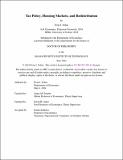Tax Policy, Housing Markets, and Redistribution
Author(s)
Soltas, Evan J.
DownloadThesis PDF (2.151Mb)
Advisor
Poterba, James M.
Autor, David H.
Terms of use
Metadata
Show full item recordAbstract
Governments make extensive use of tax policy to advance various social objectives, such as redistribution and residential integration, through the housing market. This dissertation consists of three papers, two on such housing-related tax policies and a third on means-tested transfer benefits. An introductory chapter reviews the role of government in the housing market, both in actuality and through the lens of economic theory. In the first paper, I study the impacts and incidence of subsidies for low-income housing development, leveraging new data on competitions for Low-Income Housing Tax Credits and three sources of policy variation. I find that these subsidies add few net units to the housing stock and instead pull investment forward in time. In addition, most of the subsidy accrues to developer profits or is dissipated in the fixed costs of subsidy competition. In the second paper, I study the take-up of a New York City tax incentive for developers to integrate low-income housing into market-rate buildings. I find that, while the incentive has high fiscal costs per unit relative to other housing subsidies, the cost premium is explained by differences in the distributions of low-income units across neighborhoods and may, in some neighborhoods, plausibly be repaid by the social benefits of moving households to opportunity. In the third paper, which is coauthored, we show that in eight U.S. transfer programs, selective take-up among the eligible implicitly enables the government to target people with low consumption and lifetime income. Such "self-targeting" makes automatic transfers undesirable, as the social value of this information generally exceeds the social costs of the ordeals used to reveal it.
Date issued
2024-05Department
Massachusetts Institute of Technology. Department of EconomicsPublisher
Massachusetts Institute of Technology